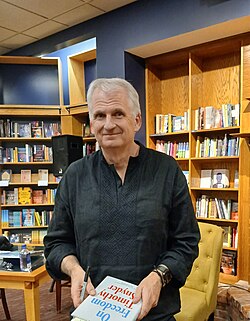Note: If you wish to receive, via e-mail, (1) my weekly newsletter or (2) daily copies of these posts, write to me at [email protected]. I’ll subscribe you via Mailchimp for the weekly or email you directly for the daily (your choice). Comments may also be sent to this address. I promise not to share your e-mail with anyone.
Monday
Because of the increasing threat of fascism in America, some top scholars have packed up their bags and taken up university positions abroad. As an MSNBC article reports,
Yale professors Marci Shore, Timothy Snyder and Jason Stanley have made their careers studying authoritarianism across the globe. Now, they’re sharing their concerns about the rise of fascism in the U.S., where they say the situation has become so dire that they have decided to leave the country and their posts at the prestigious university to teach in Canada, warning that America is facing a “democratic emergency.”
Although some critics have argued that the three should have stayed at home to fight—and although the Cavafy poem that I share today counsels against leaving one’s own country—I’m of the opinion that one should do whatever it takes to resist Trumpism. Grabbing headlines by relocating abroad is one way to dramatize the danger. Staying in America to participate in demonstrations and talk to neighbors is another response.
In the first stanza, “The City” captures the discouragement many of us are feeling at the moment. We have invested lifetimes of energy and love in this country, only to see destroyers tear it apart in a matter of months. No wonder that so many fantasize about leaving:
You said: “I’ll go to another country, go to another shore,
find another city better than this one.
Whatever I try to do is fated to turn out wrong
and my heart lies buried as though it were something dead.
How long can I let my mind molder in this place?
Wherever I turn, wherever I happen to look,
I see the black ruins of my life, here,
where I’ve spent so many years, wasted them, destroyed them totally.”
Years ago I felt this way about America. Raised as I was in the segregated south and then, when I reached college, witnessing the horrors of the Vietnam War, it’s understandable why I looked for alternatives elsewhere. I became enchanted with Eastern European cinema, which suggested that there were places in the world that took art seriously and that cared about everyone, not just the rich. The result was a Fulbright year in Slovenia (then part of Yugoslavia), which had been experimenting with what they called “market socialism.”
While I fell in love with Slovenia and have returned many times since, what I also discovered is that there is no perfect country, that every nation has flaws as well as virtues. Also, I learned that I had both America’s flaws and virtues within me, both its arrogance and its optimism, its naiveté and its energy. I learned that my soul was so American that only the threat of imprisonment or death would ever cause me to leave this country permanently. And, who knows, even that might not be enough. Of course, that’s assuming that leaving would even be possible.
In the end, living abroad for a year is what I needed to fall back in love with America.
Upon returning, I sought to take advantage of my new knowledge. I shifted in how I saw myself, how I related to others, how I operated politically. I became more tolerant of gradual change, less discouraged by setbacks. Only if we are open to such introspection, Cavafy tells us in his second stanza, will we avoid disillusion and bitterness.
Actually, he puts it negatively: if we fantasize that everything will be better in a new country and upon another shore, we are sure to be disappointed. If we don’t internally change, we will simply replicate the same life we were living previously:
You won’t find a new country, won’t find another shore.
This city will always pursue you. You will walk
the same streets, grow old in the same neighborhoods,
will turn gray in these same houses.
You will always end up in this city. Don’t hope for things elsewhere:
there is no ship for you, there is no road.
As you’ve wasted your life here, in this small corner,
you’ve destroyed it everywhere else in the world.
So, while I wish Snyder the best and will continue to read his indispensable writings on tyranny, he would do well to heed Cavafy’s cautions.


